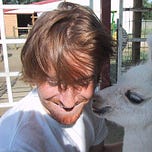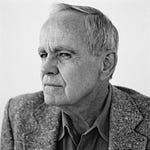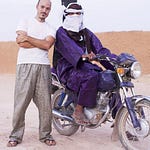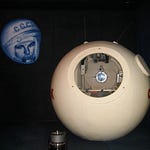Back in 2003, I went to San Francisco to write about the most disruptive dude in the music business - and in many ways the entire entertainment business - at the time, Justin Frankel. Frankel remains a hacker’s hacker, having made the two of the time’s radically innovative and impactful wares: the digital music player, Winamp, and the file-sharing network, Gnutella. You can read my original Rolling Stone story below.
A lot of my research time is spent hanging out with the people I’m writing about. I’m a professional hanger outter. To truly hang with someone means to do whatever they’d usually do. I’ve shot model rockets with John Carmack, played Dungeons & Dragons with its co-creator Gary Gygax, cracked king crab legs at Hooters with Zola.
When I was hanging out with Justin and his half-brother Brennan in his garage, he wanted to jam on his drums, so I strapped on his electric guitar and Brennan handled vocals and bass. I remain a pretty terrible guitar player, but I did my best in the name of journalism. Along with the story, I’m posting the one take, one time, one awful song here: our feeble scorcher entitled “Shut Your Mouth!” I take no responsibity for this tragic artificat being stuck in your head.
“The World’s Most Dangerous Geek” by David Kushner originally appeared in Rolling Stone, January 13, 2004.
The most dangerous man in music is ready to rock. It's Saturday night in San Francisco as Justin Frankel, gangly and bed-headed, ambles through the warehouse garage he aptly calls his "playground." He has come here, as he often does, to screw around on his drums or his Moog or electric guitar. But first he needs his fog machine.
"It's around here somewhere," he says, checking under his makeshift concert stage, a riser set against a wall postered with naked women. Then he looks under his Porsche, his Go Big scooter, his gutted Audi. He pokes his head behind a hacked Xbox, pulsing the word SeXbox onto a forty-two-inch plasma screen. No luck. Not to worry, there's always his light-show laser. A twenty-five-year-old once worth $100 million deserves his toys.
If you've downloaded a song in the past few years, it's in large part because of Justin Frankel. Seven years ago, when he was just eighteen, he invented Winamp, the first software program that made it easy to play digital music on your computer. A few years later, he created Gnutella: the vast, and vastly controversial, online network that lets you swap songs. The fact that Frankel secretly did the latter while working at America Online, the company behind his multimillion-dollar buyout, made him both the internet's greatest punk -- and hero. Now he's about to punk the industry again.
That's because, after years of being muzzled by AOL for igniting the pirate nation, Frankel is breaking his silence. "This is an environment where I don't get to do what I want to do," he says. What he wants to do is even more radical than Gnutella. And to do this, he needs to break free. "Eighty percent of the people at AOL are clueless," he says. When I ask him if they have anything to fear by him leaving, he replies, half-jokingly, "If anything, they have more to fear when I'm working for them."
Frankel kills the lights and gets behind the drums. Despite my rusty chops, he encourages me to strap on an electric guitar. "Things I've done are often interpreted as anti-record-industry," he says, "but it's really about empowering people."
Back in 1996, when a seventeen-year-old Frankel downloaded his first MP3 -- "Pepper," by the Butthole Surfers -- no one really cared about such things. Napster didn't exist. The Recording Industry Association of America hadn't sued a twelve-year-old girl in the projects for downloading, among other things, the theme song to the TV show Full House, and America Online hadn't started hemorrhaging 2 million subscribers a year.
The son of a lawyer and a postal worker/health food store employee, Frankel grew up in a mobile home in the hippie nexus of Sedona, Arizona, where he spent his afternoons taking apart old radios or constructing elaborate model airplanes. "Once Justin gets an idea for something," his father, Charles, says, "he finds a way to create it."
Unchallenged by classes, Frankel took control of his own education, largely directing his own home schooling. Around then, he also started messing with his brother's Atari 8-bit computer. By the time he started high school, he was a self-taught whiz. He ran the school's computer network and racked up a better than 4.0 GPA in his senior year. In addition to writing an e-mail program for the school, Frankel coded software he called Happy Bug, which would log the keystrokes of people at their machines. "It would show you everything they typed," he recalls. But he didn't create the program to steal tests or eavesdrop, he says. "It was more like, 'Cool, look what I can do.'"
After graduating from high school in 1996, he enrolled at the University of Utah, but he clashed with his more traditional computer-science professors and dropped out after two quarters. A few months later, he uploaded Winamp (the name is short for Windows Audio MPEG Player). With its equalizer, playlist features and trippy visuals, Winamp trumped every MP3 player out there. In a year and a half, 15 million people downloaded the program. A sizable portion even sent in the voluntary ten-dollar shareware fee that Frankel had requested, reluctantly, on his parents' advice. With tens of thousands of dollars coming in every month, his dad took off time from his law practice to help field calls from companies that wanted to cash in on the outfit Justin nihilistically called Nullsoft, a play on Microsoft.
But Justin, despite buying himself a used turbo Audi, was in no rush to sell out. Early on, he had included the tag line "Winamp whips the llama's ass" (riffed from a line in a song by the late schizophrenic Chicago street singer Wesley Willis) on every player. When a pharmaceutical company offered big money to adapt Winamp for use in sales presentations -- on the condition that he remove the tag line -- Frankel balked, and the deal fell apart.
Soon, Frankel coded another program, Shoutcast, do-it-yourself broadcasting software that let people "stream" their own audio over the Net. By 1999, Winamp and Shoutcast put digital music -- and its young creator -- on the map. And America Online wanted in, to the tune of $100 million. Frankel responded with two words: "Holy crap!"
In addition to acquiring Nullsoft in the summer of 1999, the company paid $300 million for Spinner, the leading online-radio service at the time. These were the boom years, and the message was loud and clear: The future of music was on the "information superhighway," and Justin Frankel, hired to further develop Winamp as the standard MP3 player, was going to drive it. And AOL was going to own it. In a statement, AOL's chief operating officer, Bob Pittman, the guy who had previously created MTV, trumpeted, "Combining these leading Internet music brands with the audience reach of our brands will lift music online to the next level of popularity." He had no idea.
"All right, Radiohead!" says Frankel, shuffling to a row of CDs inside Amoeba Music, a sprawlingly hip record store in Haight-Ashbury. He's wearing jeans, a white T-shirt and a black fleece jacket. He has the patchy Chia-like beard of a dude who doesn't give a shit about patchy Chia-like beards.
"When Hail to the Thief leaked on the internet," Frankel says, "I was like, 'Right on!' But I still bought the CD. I think it's wrong to download music and never give anything to the artist. But if you download something and you're like, 'This sucks,' and you never listen to it again, I don't think there's anything wrong with that." A true child of Sedona, Frankel maintains a heartfelt sense of morality and karma. It's this passion to do right by music fans that inspired him to create the very thing that so many people consider to be wrong: Gnutella.
Gnutella's birth came at the end of what Frankel now calls his "very short honeymoon" with America Online. At first, it seemed like the ultimate setup: good money, a nice office and the freedom to work on the next version of Winamp. But it didn't take long for things to sour. Almost immediately after the deal was struck, persnickety hackers online cried "sellout." Frankel's girlfriend broke up with him because, he says, "she got freaked out by the money." And the big, open office Nullsoft and Spinner shared in San Francisco got Dilbertized by AOL. "Three months after we arrived," Frankel says, "they built all these cubicles, and it sucked."
It was inside his cubicle one day that Frankel first saw Napster. File-trading wasn't new. But Shawn Fanning, Napster's nineteen-year-old creator, had coded a clever piece of software that made this geekish pastime user-friendly. "When I first saw Napster, I thought, 'Wow, that's pretty cool,' " Frankel says, " 'but how will they keep from getting sued?'"
Napster had a fatal flaw. Fanning was using a bank of his company's own computers to facilitate all those Metallica songs flying back and forth online, and Fanning was setting himself up to profit from copyright infringement. "Napster was a company built on people doing things that are illegal," Frankel says. "That's wrong." Rob Lord, who had joined Nullsoft's team, even tipped off the RIAA to Napster.
Frankel decided to "take the wind out of Napster's sails." His solution: an online network that could let people trade all kinds of files -- songs, videos, whatever -- in a decentralized environment. By connecting people's computers directly with one another, they could trade data without having to go through some company's rack of servers. Best of all, Frankel thought, such technology would be good karma, too. "I would not be getting any money from it," he says. "I'd be giving power to people, and what can be wrong with that?"
Frankel got to work on what became Gnutella, named after the chocolate-hazelnut spread and, more tellingly, the "GNU" free-software project. He coded fast and on the sly. "I didn't want AOL to find out," he says, "because they'd prevent it from happening."
On March 14th, 2000, Frankel and Tom Pepper, a Nullsoft cohort, uploaded an early version of Gnutella, with a note: "Justin and Tom work for Nullsoft, makers of Winamp and Shoutcast. See? AOL can bring you good things!" The next day, Frankel was with his parents touring Alcatraz, appropriately enough, when his cell phone rang. It was Pepper. "Dude," Pepper said, "you better get back to the office."
By the time Frankel returned, he says, "the shit had hit the fan." The timing of Gnutella couldn't have been worse from the company's point of view. AOL was in the midst of trying to merge with Time Warner, which was involved in suing Napster for facilitating copyright infringement.
AOL ordered him to take the program down immediately, and the company put out a statement calling Gnutella an "unauthorized freelance project." But Gnutella, unlike Napster, couldn't be stopped. More than 10,000 people had downloaded the beta software that first day, and intrepid hackers had gone to work to reverse-engineer it and throw it into the hands of the open-source community, laying the foundation for BearShare, Morpheus, LimeWire and other file-trading wares.
With Gnutella, Napster became almost irrelevant. There was no company to sue, no computers to shut down. AOL had paid Frankel $100 million for a slice of the future, but Frankel decided he'd rather give the future away.
After that, Frankel says, AOL kept him on "a very short leash," steering him away from interviewers and encouraging him to focus on Winamp, the program they paid him 100 million friggin' dollars to work on in the first place. Not surprisingly, he acted out. In September 2000, he uploaded a program called AIMazing, which would replace the banner ads in AOL's Instant Messenger with an image of a musical heartbeat. Frankel called it nothing more than "a cute innovation." The Wall Street Journal called Frankel "AOL's loose cannon."
AOL cracked down, again -- this time requiring Frankel to seek approval before blogging online. "We fought off the AOL bullshit as much as possible," he says. When the company tried to insist that an AOL icon instantly appear on a user's desktop during a Winamp installation, Frankel hit the roof. "I'd be like, 'Look, our users don't want to use AOL!' " he says. " 'They think AOL sucks!'"
But Winamp was having problems of its own, losing ground to Windows Media and RealPlayer, both of which incorporated video streaming. Nullsoft attempted to re-establish the brand with Winamp 3.0. But the new version was bloated, if not somewhat embarrassing -- particularly for Frankel, who prided himself on lean, simple wares. On Frankel's urging, Nullsoft trimmed back the next version of the player, calling it Winamp 2.9.
Around that time, Frankel began tinkering with a new kind of software. Taking the name from an underground postal system in the Thomas Pynchon novel The Crying of Lot 49, Frankel created Waste: a "private workspace," as he calls it, that allows small groups of friends to trade files without being as conspicuous as those on the larger peer-to-peer networks.
Sometimes called a "darknet," it's a kind of mini-Gnutella, a small, password-protected file-trading network. Because you can't get in unless you're invited, even the most intrepid hackers -- or recording-industry lawyers -- would have trouble figuring out when or where a Waste system is running.
This time around, Frankel took the high road. He tried pitching Waste to AOL, but after the company dragged its feet for months, he got fed up. On May 28th, 2003, four years to the date that he was acquired, Frankel rebelled again -- uploading Waste as a way to force AOL to deal with it, and him, once and for all. "AOL as a company should not just sit on their asses and try to keep from losing as many subscribers as it can," he says. "I mean, I'm a stockholder of the company. I want them innovating. I want them doing things that are good for the world and being socially conscious."
AOL responded by taking the program down. (AOL had no comment about Waste for this story.) Days later, Frankel took it to the people one last time. "For me, coding is a form of self-expression," he wrote online late one night. "The company controls the most effective means of self-expression I have. This is unacceptable to me as an individual, therefore I must leav [sic]. . . . "
"Shut your mouth! Shut your mouth! Raise your hand if you need to take a piss!"
Night is falling on Frankel's warehouse, and we're midway through an impromptu jam onstage. Frankel's half brother Brennan, another Nullsoft staffer, is belting out these lyrics for a song about obedience and oppression. When I joke that it sounds like it's inspired by real life, no one argues. "America Online as a company is all right," Frankel says diplomatically, "but big companies have limitations about what they can or can't do."
A few weeks after I visit, AOL proved his point once again. On December 9th, the company shut down the San Francisco office that once housed Nullsoft and Spinner, and laid off 450 employees, including Frankel's half brother, Brennan. The next week, Frankel uploaded what could be his swan song as an AOL employee: Winamp, version 5.0. In the near future, he says, he's going to have a sit-down with his boss and enthusiastically return to a riskier way of life. This could include some new programs such as a free and open solution for mobile text messaging -- a kind of Gnutella spin on BlackBerry -- or some other stuff that he won't reveal. "Those are the really good ideas," he says.
In many ways, Frankel's future encapsulates the debate over the future of the internet itself. Does it become just a distribution system for corporate product or more of a way to subvert that corporate control? For Frankel, subversion is in the eye of the beholder. "The question is," he says, "do you think people are ultimately good or bad? Do they want to do the right thing, or do they want to do what's good for them and fuck everyone else? I hope it's not the latter."
With our song done, Frankel and Brennan tweak the mix into shape. "I'll put this online," Frankel tells me, cracking a grin, "with your permission, of course."
To read more of my feature stories, as well as posts from my longform project, Masters of Disruption: How the Gamer Generation Built the Future, please subscribe below. Thanks!












